Rachel Neumeier's Blog, page 167
June 19, 2020
Pick a cover
Sarah Higbee of Brainfluff rounded up a bunch of different covers that have been used hither and yon for The Bone Clocks. These are really interesting to compare! Here they are:
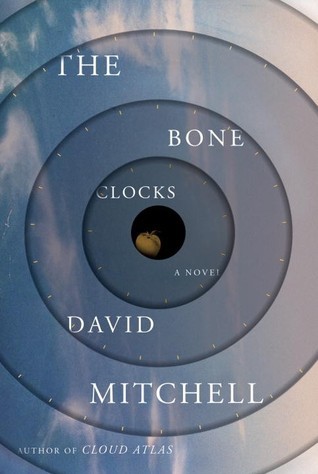 American
American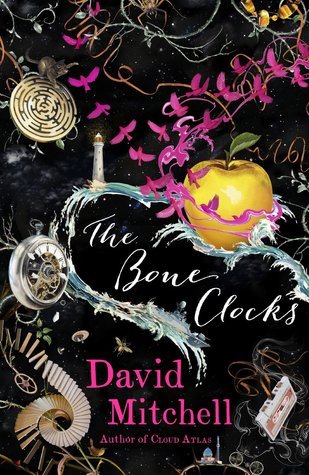 British
British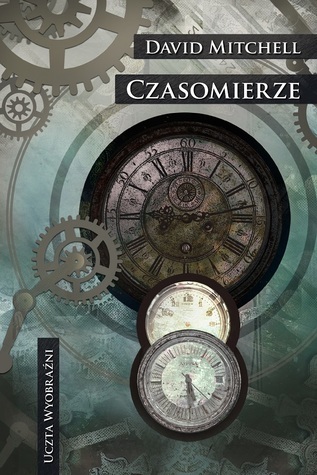 Polish
Polish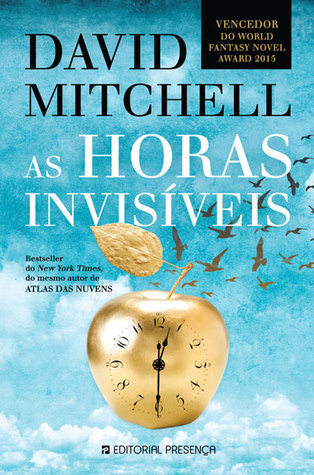 Portuguese
Portuguese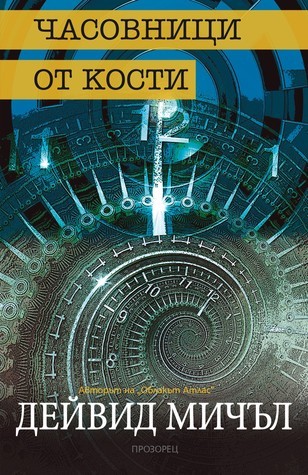 Bulgarian
BulgarianHow about it? I like all of these except the British cover, which is too cluttered for me. But my favorite is … the Polish cover! Really love that one! My second pick is the Bulgarian cover.
A great set of covers overall. I’ve never actually read this book. Let me take a look at the description …
Following a terrible fight with her mother over her boyfriend, fifteen-year-old Holly Sykes slams the door on her family and her old life. But Holly is no typical teenage runaway: A sensitive child once contacted by voices she knew only as “the radio people,” Holly is a lightning rod for psychic phenomena. Now, as she wanders deeper into the English countryside, visions and coincidences reorder her reality until they assume the aura of a nightmare brought to life.
For Holly has caught the attention of a cabal of dangerous mystics—and their enemies. But her lost weekend is merely the prelude to a shocking disappearance that leaves her family irrevocably scarred. This unsolved mystery will echo through every decade of Holly’s life, affecting all the people Holly loves—even the ones who are not yet born. …
I’m losing interest in this book. “Nightmare brought to life.” “Irrevocably scarred.” I’m thinking at this point, yeah, probably not for me. The description continues:
A Cambridge scholarship boy grooming himself for wealth and influence, a conflicted father who feels alive only while reporting on the war in Iraq, a middle-aged writer mourning his exile from the bestseller list—all have a part to play in this surreal, invisible war on the margins of our world. From the medieval Swiss Alps to the nineteenth-century Australian bush, from a hotel in Shanghai to a Manhattan townhouse in the near future, their stories come together in moments of everyday grace and extraordinary wonder.
I have to say, no one here sounds remotely like a character I’d like to spend time with, no matter how fantastic and clever the writing may be. Then we wind up with “everyday grace and extraordinary wonder” and for the first time I’m thinking well, maybe.
Have any of you read this one?
Either way, which cover do you prefer?
Please Feel Free to Share:








June 18, 2020
Superhero bundle
Hey, this superhero bundle just brought itself to my attention. I’m hesitant about bundles because my TBR pile is soooo over the top already, and yet here we are.
I think I’m probably going to try this one. Has anybody by chance read any of these already so they could contribute a thumbs up on one or more of the books included?
For $5 —
Captain Nemo – The Fantastic Adventures of a Dark Genius by Kevin J. AndersonCynetic Wolf by Matt WardWorking Class Hero by James Robert SmithDove Season by Robin BrandeThe Superhero’s Test by Lucas Flint
Included for $15 —
Playing a Hunch by Dean Wesley SmithFid’s Crusade by David ReissThe Enlivening by Ashlyn FrostNobody’s Hero by Mark LeslieMorning Sun by Jeremy FlaggOverlook by Jon MollisonHellbent by Tina GlasneckBrave New World Revolution by Matt Forbeck
I will add that my favorite superhero books I can think of , at least at the moment, are:
I found the ending weak in some ways. But I still liked this book a lot. Quick, engaging. Villain pov, but obviously I wouldn’t have liked it if he’d actually been a villain. I need to re-read this, I really do. You can read my review if you click on the Amazon link; mine seems to be at the top for this one’s reviews.
and
And All the Stars by Andrea K Höst
Which, I KNOW, is not exactly a superhero novel. Or not only a superhero novel. But it is definitely a now-you-have-super-powers novel, plus the alien invasion. Plus one of the most astonishing plot twists EVER.
One of the books I disliked most in all my reading life also falls into the superhero subgenre. I guess I won’t name that one. I ranted about it at the time, as I recall, but I didn’t post any reviews anywhere because, well, it was quite a rant and I don’t really want to drop one-star reviews on anybody’s book no matter how much I loathed it.
Of course there’s no end to superhero stories out there, very few of which I’ve read. If you’ve got a favorite, drop it in the comments, by all means.
Please Feel Free to Share:








June 17, 2020
Hi, I’m beautiful, talented, and caring
This is a fun post about characterization from James Scott Bell at Kill Zone Blog: How to characterize
[T]he second paragraph went something like this: She was beautiful, talented, and caring. She was a hard worker, and earned every bit of her success…
It went on in the same vein for a few more lines. And I found myself thinking, “Really? You expect me to believe this?” …
How would we feel if we met someone for the first time at a party, and the person said, “Nice to meet you. I’m beautiful and talented and caring. But enough about me.”
I didn’t laugh out loud, but I chuckled. That’s a pretty good analogy: introducing a character that way IS a lot like introducing yourself that way. In fiction, it certainly screams “badly written Mary Sue.” In real life, well, we shall assume that this never, ever happens in real life. Bell advises that to avoid this problem, the author should show and not tell — I imagine everyone has heard that before.
And since everyone always says “show, don’t tell,” let me add that there are absolutely times to tell and not show. Here, in fact, is a different post about times when you may want to do exactly that. This post suggests, briefly, that telling may most often be useful when writing a transition to get from one scene to another or one time to another; when glossing lightly over over unimportant action or unimportant characters; or when adding backstory. That sounds basically about right to me.
Later in his post, it seems to me that James Scott Bell is advocating an unusually high level of deliberate thought in the writing process: Brainstorm possible actions and dialogue that will show us these things, and salt them in early in your novel, for example. My basic response to this advice is: Good heavens, that sounds painful. How about just writing the beginning of your novel. Characters will do stuff and say stuff and there you go, characterization. I suppose more writers than I realize might do this more mechanically. I find that hard to imagine.
His other advice seems more reasonable to me: have other characters react to the protagonist. Let their reactions show your protagonist more clearly to your readers. He provides some pretty good examples there if you wish to click through.
This sort of post benefits from great examples of well-done characterization in the opening scene, so let me see, what are some examples that occur to me right off … all right:
The Breach by Patrick Lee offers a fantastic example of developing the character very naturally and organically through his thoughts and actions. I’m certain I’ve used this one as an example before, and by the way, it’s a fantastic thriller, so if you haven’t read it, take a look.
The Blue Place by Nicola Griffith, which I just referred to for something else the other day, so it’s on my mind. Aud is one of the most amazingly written characters I can think of.
So, you remember how The Wizard Hunters starts out, with Tremaine contemplating suicide? Of course it turns out she had a little nudge from a despairing sorcerer trapped in a sphere, but still, right off the bat, her character is established by showing her in this darkly contemplative mood.
Oh, of course, Murderbot, with those waves of I-don’t-care interspersed with actions that show it absolutely does care.
Walk on Earth a Stranger by Rae Carson opens with strong characterization and then goes on from there, basically getting better and better. You need to be up for a novel where the journey is the story.
In Carson’s novel, having the story be the journey worked for me; in some books, the journey feels too much like the author should say, “Three months later …” and go on with the real story. In order to compress time that way, incidentally, the author would tell and not show.
Please Feel Free to Share:








June 16, 2020
Pronouns
Here is a quite good post at Writers in the Storm: Harnessing the Power of Pronouns
Sit with this simple sentence for a moment:
Look at what they are doing to my city.
More than likely when you read that sentence, your inner voice reacted. How did it make you feel? What did it make you think about?
Consider this sentence below and notice what changing the pronouns does to the tone, feel, and imagery.
Look at what we are doing to our city.
The author of this post, John Peragine, then goes on to discuss pronouns in some depth, spurred on, we find out, by his experience changing a third-person manuscript into a first-person manuscript.
And who hasn’t been there, right?
I’m glad to say I have never had to do this for a WHOLE manuscript, but I’ve done it for pretty big blocks of pages. Not recently. This was way long ago, when I first took a stab at writing a first-person novel and gave up because wow, that is just not the same as third-person. That’s when I found out several useful things:
a) verbs are harder to handle in first-person narratives, and
b) if you don’t know who the protagonist is telling the story to, that can actually screw up the writing process terribly, at least for me. I know that not all authors have this problem, but it messed up my initial attempts at first person.
I have mentioned the problem with first-person verbs before, in posts generally inspired by seeing yet another author handle verbs badly. The fundamental problem is that when you’re writing a third-person past-tense narrative and the protagonist thinks, “Vampires were a serious problem in Georgia,” this is fine. It implies nothing. But when you’re writing a first-person past-tense narrative and your protagonist thinks, “Vampires were a serious problem in Georgia,” this absolutely implies that now they’re not.
Most of the time, the author does not realize there is a problem, so this happens a lot and the reader experiences an instant of confusion over and over. Readers (many readers) tolerate this well, partly because the problem is extremely common, so readers have lots of practice tolerating it. But even if readers will put up with this, is still not a great thing to do.
The proper way to manage verb tenses in first-person narratives is to let the protagonist make general statements about the world in present tense and then switch back to past tense as the narrative continues. This requires the author to pay attention to which statements are about the world and which ones carry the story forward and are part of the narrative. This is hard.
TUYO is, as you may have noticed, my only published first-person story (other than “Vigilante” in Beyond the Dreams We Know). I found TUYO so much easier to write than my (very) early tries at this form that there is just no comparison. I’m not sure why that is, except I have read a lot more first-person novels in the interim, and have therefore had a chance to critically notice a whole lot of good verb use and bad verb use in the process. Anyway, whatever, the point is, the form was much easier for me this time around.
I also have a notion to whom Ryo might be telling the story. I might be wrong, but kind of having an idea about that also probably helped.
Anyway, I’m not saying I’m absolutely certain I never screwed up the verb tenses, but if you pay attention in TUYO, you should see that every time Ryo thinks about the state of the world or the nature of Ugaro people or whatever, he thinks about that in the present tense. Then the narrative goes on in the past tense. So he’ll think, “Everyone knows the Lau are a deceptive people,” and then immediately, “But there was no reason he should have lied to me.”
If you read lots of well-written first-person narratives, you will see that this is generally how the authors do it. For example, I just checked The Blue Place by Nicola Griffith because she’s such a fabulous writer, I knew she would handle verb tenses this way and sure enough, there we go, right away we see: The sidewalks around Inman Park are made from uneven hexagons … and then right back to a past-tense narrative.
Let me also just mention a different but related pronoun/verb issue that drives me up the wall whenever I see it:
Every single time the direct thought of the protagonist is reported to the reader, that thought should be in the present tense, regardless of whether the story is being told in first- or third-person.
Absolutely no one ever sees a puppy come up for attention, bends down to pet the puppy, and thinks, “Wow, that was a cute puppy!” That is as wrong and awkward as if a puppy ran up and jumped on you, and you turned and said to a friend, “Wow, wasn’t that a cute puppy!” while the puppy is actually still right there, still jumping and wagging and being adorable. OBVIOUSLY in both cases, you would think or say, “Wow, THIS IS a cute puppy!” I don’t understand what that is not absolutely crystal clear.
Yet a lot of authors working with first-person past-tense narratives put past tense thoughts in the protagonist’s head in exactly this way. It’s so common I had a copy editor once try to do this to a direct thought for one of my THIRD person protagonists. [I wrote a little note saying No no no and here is why and absolutely do not do this. It’s one of the few times I wrote a note instead of just STET.]
Anyway, the post I linked way at the top is more about things like the she-is-a-subject, her-is-an-object distinction. That is useful and I hope a lot of people read that post, because last I noticed every single grammar checker on the market absolutely cannot tell the difference and fails to mark things like, “My dad drove my mother and I to the park” as wrong, and wow is that an annoying mistake. So you can certainly click through and read that article if you wish; the examples are fine. I just got distracted thinking about changing a whole manuscript from third- to first-person, and wondering whether the author also took another good look at verb tenses in his novel.
Please Feel Free to Share:








Tuyo audiobook update
Wow, it was not entirely intuitive how to post an audition script exactly the right way. I accidentally offered payment up front AND splitting royalties, which gave me a few complicated days. However, that is now sorted out and everything is fine.
So: yes, I have a narrator for TUYO. I really like his voice and I think his style is very good. Because he agreed to do the project royalty-share only, he will be fitting TUYO in around other projects and estimates that it will be finished in around two months. I said that was fine! He seems very professional and I’m glad he’s willing to do it.
So my first guess is that TUYO will be available as an audiobook in September or (depending on how fast ACX puts through finished works) maybe November. I have that long to figure out how to best promote audiobooks, so I’m sure that will be fun.
I wound up getting eleven auditions, but some, not sure how many, under basically false pretenses because they thought I was doing royalty-share-plus instead of royalty-share-only. Still, many of the narrators willing to do royalty-share-only seem perfectly good. I made a note of one in particular for a different project (soon to be announced).
Hopefully in the future I’ll be all, “Oh yeah, it’ll earn back the cost of paying a narrator in three weeks, so no problem!” But I’m glad there is this royalty-share-only option for right now.
Please Feel Free to Share:








June 15, 2020
Book hangovers
Here’s a post at Book Riot: The Psychology of Book Hangovers
A “book hangover” is the slangy shortcut for the feeling when a reader finishes a book—usually fiction—and they can’t stop thinking about the fictional world that has run out of pages. The story is over, but the reader misses the characters or the atmosphere of the novel. Personally, I know the hangover is bad when I have trouble even looking at another book. What passing delights can a new novel hold for me when I only want more of the story I just finished?
Sure, that happens to me all the time. Literally dozens of times per year. Not all good books cause this phenomenon, but lots of them do. Generally speaking, my response is to immediately read part or all of the book again. I re-read From All False Doctrine from cover to cover just a few weeks after reading it for the first time. That’s something that works for me when I have a book hangover. (I’m currently reading the sequel, Neither Have I Wings, which is imo not as good and not going to cause a hangover.)
After re-reading a book, I’ll very likely still be in a hungover mood and I may not read anything for several days or a week. After THAT, I am either in a “reading slump” I specifically make an effort to break out of; or I listlessly try some new-to-me book that turns out to be really good and knocks me out of the original book hangover while setting me up for another one.
Incidentally, when a reading slump wants to turn into a Thing, I most often get out of that by picking up a book that previously caused a book hangover. Re-reading a novel I really love is the single best way I’ve found, maybe the only way, to knock myself out of a reading slump. Oh, no, there’s one other way that reliably works: picking up a new book set in a familiar world. That’s very much like re-reading because the world and often the characters are familiar and appealing. For me, Ilona Andrews works well this way.
The Book Riot post emphasizes sadness at the book’s ending and discusses ways in which a lingering book hangover signals an opportunity for personal growth, and honestly the whole thesis seems to perhaps have gotten a little overblown at that point. I don’t quite believe that a book hangover a bad thing, or even a sad thing; and a lingering period in which I don’t want to pick up another book has nothing to do, as far as I can tell, with personal change or anything like that. I mean, now and then, probably, but that’s hardly typical. As far as I’m concerned, I just want to spend more time with the familiar world and characters in that book and I’m disappointed there’s no immediate sequel and I’m not in the mood to read anything else. To me, none of that seems particularly sad, except in the sense that all fictional series are finite, and that’s difficult to avoid.
I wonder if it’s possible that readers who experience a book hangover rather rarely also experience it as a bigger deal than I do; and I also wonder if people who re-read a LOT, which I do, have less trouble with book hangovers because we freely revisit the book we loved and enjoy the re-reading process almost as much, sometimes more, as reading the book for the first time. When re-reading From All False Doctrine, I greatly enjoyed picking up lots of hints I missed the first time through.
Please Feel Free to Share:








June 12, 2020
Another handful of SPFBO6 titles with no romance
After posting the 24 or so “friendship, no romance” titles submitted to the 6th annual Self-Publishing Fantasy Blog-Off, naturally a handful of other entries were brought to my notice.
This brings the total proportion of submissions this year that center friendship rather than romance to a startling 10%. Not that 90% isn’t a pretty overwhelming majority, but 10% is a substantially larger percentage than I expected. I do think the proportion of no-romance fantasy is smaller in traditionally published works, but I could be wrong. In the next week or so, I’ll try to come up with a handful of my favorite traditionally published fantasy novels that don’t include romance. For the moment, here are the remaining SPFBO6 entries in that category, so consider this continued from the previous post:
25. Steve Gowland, Soul’s Abyss.
As Kaoldan fights to unravel the mystery and his own dark past, reunited with his daughters after years apart throws him into another unfamiliar role – how to be a father again. This is another battle he cannot lose.
26. ED Lazure, Of Fractured Lands and Sundered Dreams:
[F]acing a revolt by the enslaved Dwarfs, Faija Soothing Wind must find the will to survive and to embrace motherhood. On the run with her daughter, she meets an ailing slave claiming a divine mission which would lead north to Fimara, the accursed land of her ancestors.
27. M Askins, Beyond the Spire of Naverene:
A Young Knight undertakes an impossible quest deep into the fabled and perilous Fenrirfang in order to protect his sister from a conspiracy that involves the Church that he has sworn to serve.
28, Toby Frost, Blood Under Water:
Giulia Degarno thought that coming to Averrio would be the start of a new life. But when a renegade priest turns up dead in a canal, the City Watch needs somebody to take the blame. And who better than a woman with a dark past and an even darker future?
I haven’t been posting covers in these lists because there are so many entries and covers take a certain amount of room, as well as time to get the images. But I really like this cover, so here:
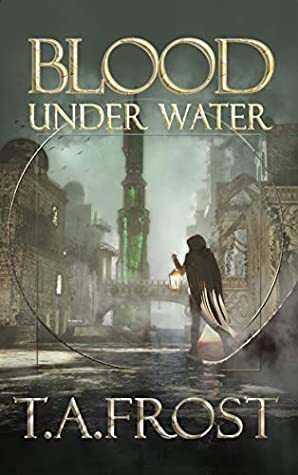
Okay, a few more, let me see, what number are we on …
29. Gordon Greenhill, Flight of the SkyCricket:
[T]hree sisters-Eli, Anna, and Rose Hoover-stumble through a window in the wine cellar of an old Victorian house and find themselves in Errus, a world where natural disasters give birth to mythological creatures-some harmless, some horrific.
This one looks like a MG story, which makes the second MG entry I’ve seen. This is a tough contest for MG novels, but this one does look like it’s got plenty of charm.
30. Keith Blenman, The Girl Drank Poison;
[T]ragedy befalls Zellin Percour, a young woman tricked into drinking an expired love potion. Now, transformed into an abomination, she’s rampaging her way toward the town of Sleeping Bear, hellbent on finding the man who deceived her…
There we go, 30 entries out of 300, exactly 10%. Quite a few of the six above look pretty decent, don’t they? I’m not sure Blood Under Water is eligible, actually, since it is Book 2 in a series and I sort of thought I saw somewhere that all entries had to be standalone or Book 1. In this case, the first book is called Up to the Throne, and sounds rather promising:
Giulia Degarno returns to the city-state of Pagalia with one intention: to kill the man who scarred her and left her for dead. But Publius Severra is no longer a mere criminal, and has risen to become a powerful politician – and perhaps the only man who can save Pagalia from anarchy. Now, as Severra stands poised to seize the throne, Giulia must choose between taking her revenge, and saving her home.
I’m picking up a sample of this one.
Please Feel Free to Share:








June 11, 2020
How do you pronounce “Ryo?”
So, I like TUYO enough to actually take the (for me) big step of figuring out how to create an audiobook edition. I’m intimidated by learning new stuff like this, but I tackled it this week.
You can make audiobooks, in case you’re curious, via ACX, which is a division of Amazon that makes audiobooks and then makes them available via Audible. Rather than laying out a relatively huge amount of money to pay the narrator, you can split future royalties with the narrator. That’s the way I’m doing it. I don’t know what other options may exist for making audiobooks, except there’s a relatively expensive way to do it through Draft2Digital (I looked at that some time ago, and at least at that point, you had no choice but to pay the narrator up front).
So … what you do, if you’re working through ACX, is set things up and then post an audition script, which (ACX advises) should be 2-3 pages that includes dialogue by all the major characters. The tidbits included in the script need not be contiguous in the book, but in fact I used a bit from the first chapter, where Ryo first meets Aras. I feared that absolutely no one would audition because the book is really quite long, so it’s kind of a big project, and it’s a new book with a tiny handful of reviews.
[Good reviews so far, and if you’ve left one, thank you so much!]
But in fact two narrators auditioned in the first 48 hours, so I can now say with certainty that there will be an audio edition pretty soon. Also, I’m now a lot less intimidated by this whole thing, so I expect I’ll make audio editions of the Black Dog books this year too.
Now, you provide suggestions for the potential narrators when you post the script. I said, two major characters, both male, very different speaking styles, the first-person narrator is nineteen, the other protagonist is in his fifties, Midwestern American accent is fine, straightforward speaking style is fine. I also said there isn’t any romance because if *I* were going to narrate a book, I would definitely like to know whether there were any steamy sex scenes so I could decline to audition for those books, so I thought narrators might like to know that. I didn’t provide any suggestions about how to pronounce character names because I didn’t care about how the narrator pronounced those at this stage.
However, having listened to these two auditions, I do note that the two narrators pronounce the words “Ryo” and “tuyo” in a slightly different way. So … how do you all prefer to pronounce them?
Ryo = Rye-oh
Ryo = Ree-oh
Slight accent on the first syllable or something else?
Tuyo = two-yoh
Tuyo = twee-yoh
Slight accent on the first syllable or something else?
Does anybody know exactly how to pronounce “tuyo” in Spanish so I can perhaps suggest a different pronunciation? Other than not wanting to sound like “tuyo” is Spanish, I have no firm commitment to a particular pronunciation, so I expect I will go with whatever pronunciation seems to be most popular.
Let me add, in case this interests you, that the two narrators so far are quite distinctive.
Narrator 1: deeper voice, slower speech, very clear diction, no obvious attempt to distinguish between characters by altering the tone or depth or speed of speech. I think this narrator would be acceptable.
Narrator 2: lighter voice, quicker speech, clear diction, more of an effort to distinguish between characters. This is the narrator I prefer so far.
I never thought about this kind of thing much at all before. Even when I listen to audiobooks, I don’t think about this. I like some narrators better than others, but I’ve never thought about why. I think after doing this, I’m going to.
Please Feel Free to Share:








Beyond genre: categories that actually matter
Okay, so, this is largely an older post. When looking up something or other, I happened to came across this post from 2015, where I proposed three categories for fiction that have nothing to do with genre, but are actually much more important to (at least my) reader experience. You can pick any genre, and I will probably like the book if it’s well written AND belongs to the first category below. Given that, I would really appreciate it if novels were accurately labeled according the following categories:
1. Books with an underlying thread of kindness. There is a warmth to the story, let us say; a generally positive feel to the book because characters — both primary and secondary, maybe antagonists as well as protagonists — show traits such as, in no particular order, honor, courage, kindness, loyalty, self-sacrifice, and so forth. And, of course, because the good guys win. Take The Death of the Necromancer. I think of it because Nicholas is a ruthless bad guy, except not really; Ronsarde is his antagonist, except not really; Reynard is acting the part of a wastrel but is . . . how did Ronsarde put it . . . “sound as a young horse.” Etc etc. Other than the necromancer and his people, only Rive Montesq is a real bad guy. And the bad guys lose, lose, lose.
Mind you, endings don’t have to be saccharine. Even ambiguous could work, but probably only ambiguous-in-a-good-way, so to speak.
All of the books I really connect with emotionally fall into this category.
2. Books where at least some of the characters are sympathetically drawn and at least reasonably likeable, but their efforts to save the world and/or become better people go nowhere. They flounder around — or maybe act decisively — but they don’t get an actual happy ending. If there is a really evil character, that person may wind up winning at the end of the book. If not, then the most important likable character may wind up committing suicide. Grimdark fantasy is like this, but so is plenty of literary fiction — it’s not a genre-specific phenomenon.
Regardless of genre, the underlying message of the book seems to be that you just can’t win against the force of human greed, stupidity, selfishness, etc. I’m thinking of Joe Abercrombe’s First Law trilogy . Also of mysteries like Tana French’s In The Woods. Also of literary works like Barbara Kingsolver’s The Lacuna. Oh, another example: Jack Chalker’s Flux and Anchor series, where the ultimate conclusion is that the best decent people can do is create a bubble universe and shut themselves away from the rest of humanity, which can then go to hell without them having to watch. I read Chalker when I was a kid, and I still remember first realizing what it looks like when the universe is set up so the good guys can’t win. You may recall that Chalker wound up on quick list of authors who don’t appeal to me anymore. This can’t-win theme is partly why. (He has other deep themes running through his fiction that I also don’t like.)
Books like these can be brilliantly written, but quality of writing doesn’t matter: I loathe them. I finished all of the above books, but these days I definitely, definitely take a more emotionally distant stance toward a book like this as it begins to show signs of going in that kind of negative direction. Then, when it concludes in some awful way, I write off all other books by those authors forever. Them and me: not sympatico. At least, not in an author/reader way, I expect they’re all great people if you know them personally.
3. Books where all the characters are horrible people. I doubt I have ever finished a book like this. I guess the underlying message of such a book could be perceived as People Are Ugly and Life Is Ugly. An example I know of is Gone Girl. Both Ana and Thea of The Book Smugglers found Gone Girl “compulsively readable,” but in such terms that I’m quite certain I would find it eminently resistible.
There’s probably something in there between 1 and 2. I mean obviously there’s a whole infinite string of gradations between 1 and 2, and probably between 2 and 3 for that matter. I guess I’d say that my favorite novels, regardless of where they’re shelved in a bookstore or library, probably range from 1.0 to 1.3 or so. It would be quite helpful for some objective reviewer to stamp a number code between 1.0 and 3.0 on every novel in existence; that’d sure help me sort through my TBR pile faster.
Please Feel Free to Share:








June 10, 2020
SPFBO cover contest
I meant to follow the cover contest for Mark Lawrence’s self-published fantasy blog-off this year, but I must confess I lost track and didn’t. However, the results are in, and here is the link.
Here’s the winner of both the judge’s vote and the public vote:

This cover falls into the category of: I like the cover quite a bit as a piece of artwork, but (a) I wouldn’t hang it on my wall, and (b) it doesn’t make me want to read the back cover copy.
Neither of those facts is a criticism! I expect people who are more likely to enjoy this book will be attracted by this cover. Let me look up this book on Amazon … okay, here is the description:
The race is on! The gods careen toward the Blackened Nevers. Pray you don’t get in their way!
An army of criminals runs to reclaim its honor. An old knight wakes to find a child pointing to the finish line. A prison guard is cursed to return to the start. And the last two members of the Rowlach tribe run to ask their god why the race was more important than his creations. Meanwhile, deep inside their mountain, a brother and sister run to prevent the awakening of a leviathan. Will it rise to destroy creation, or is it just their god’s cynical attempt to increase his odds of winning?
I actually can’t tell for sure whether the gods themselves are competing in this race — the first bit makes it sound like that — or whether they’re wagering on mortal people they’ve chosen to drop into this race, which is what everything else makes it sound like. I have to admit, the overall description makes the story sound more appealing than the cover led me to believe. Still very possibly too gritty for my taste, but not as much so as I expected.
You can click through to see the other finalists for the cover contest. I don’t care all that much for the second place winner. I don’t like anything abstract or cartoony, and although I think the cover design is clever, I don’t really like the cover itself.
Of the covers that got at least one vote from the judges … let me see … I like this one best, and it’s not close:
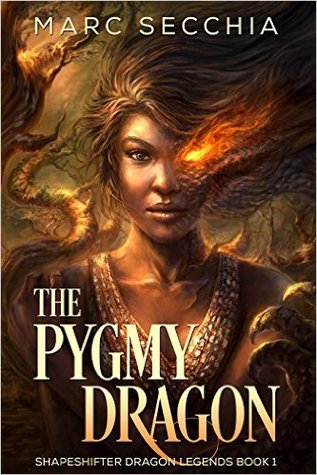
I think this is a great cover.
Here’s the description:
Stolen from her jungle home and sold to a zookeeper, Pip knows only a world behind bars, a world in which a Pygmy warrior and her giant ape friends are a zoo attraction. She dreams of being Human. She dreams of escaping to the world outside her cage.
Then, the Dragon Zardon kidnaps her into a new life. Pip rides Dragonback across the Island-World to her new school – a school inside a volcano. A school where Humans learn to be Dragon Riders. But this is only a foretaste of her magical destiny, for the Dragon Assassins are coming. They have floated an Island across the Rift and their aim is nothing less than the massacre of all Dragons.
This basic scenario could be fine, but given this description, I have enough concerns about the overall writing quality that I don’t offhand plan to try a sample. I think the plethora of capitalized words would start to have a fingernails-on-a-chalkboard quality after about one chapter.
Quite a lot of really nice covers got pulled out by various judges. Click through if you have a minute and see what you think of them.
Please Feel Free to Share:











